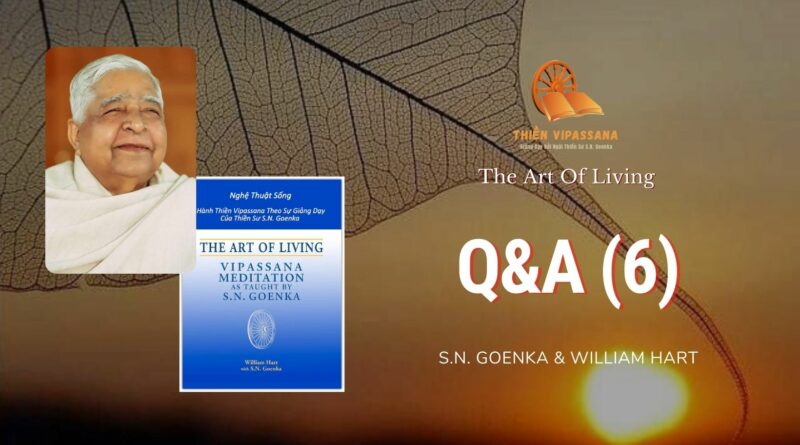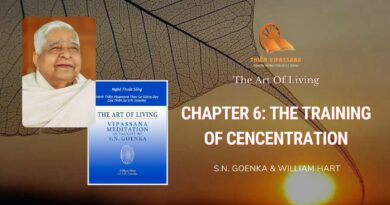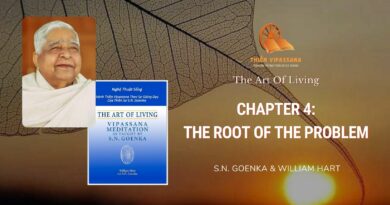Questions and Answers
QUESTION: Why do you teach students to practise ānāpāna concentrating on the nostrils rather than on the belly?
N. GOENKA: Because for us ā nāpāna is practised as a preparation for the practice of Vipassana, and in this type of Vipassana a particularly strong concentration is necessary. The more limited the area of attention, the stronger the concentration will be. For developing concentration to this degree, the abdomen is too large. Most suitable is the area of the nostrils. That is why the Buddha guided us to work in this area.
While practising awareness of respiration, is it permissible to count breaths, or to say “in” as we breathe in and “out” as we breathe out?
No, there should be no continuous verbalization. If all the time you add a word to the awareness of respiration, gradually the word will become predominant and you will forget about the breath entirely. Then whether you breathe in or out, you will say “In!” Whether you breathe out or in, you will say “Out!” The word will become a mantra. Just remain with the breath, bare breath, nothing but breath.
Why is the practice of samādhi not sufficient for liberation?
Because the purity of mind developed through samādhi is achieved primarily by suppression, not elimination of conditioning. It is just as if someone cleans a tank of muddy water by adding a precipitating agent, for example, alum. The alum causes the mud particles suspended in the water to fall to the bottom of the tank, leaving the water crystal-clear. Similarly samādhi makes the upper levels of the mind crystal-clear, but a deposit of impurities remains in the unconscious. These latent impurities must be removed in order to reach liberation. And to remove the impurities from the depths of the mind, one must practise Vipassana.
Isn’t it harmful to forget the past and future entirely and to give attention only to the present moment? After all, isn’t that the way animals live? Surely whoever forgets the past is condemned to repeat it.
This technique will not teach you to forget the past entirely or to have no concern for the future. But the present mental habit pattern is to immerse oneself constantly in past memories or in cravings, plans, or fears for the future, and to remain ignorant of the present. This unhealthy habit makes life miserable. By meditation you learn to keep a firm foothold in the present reality. With this solid base you can take the necessary guidance from the past and make proper provision for the future.
I find that when I meditate and the mind wanders, a craving may start, and then I think I’m not supposed to crave, and I start getting agitated because I am craving. How should I deal with this?
Why get agitated because of the craving? Just accept the fact: “Look, there is craving”—that’s all. And you will come out of it. When you find that the mind has wandered you accept: “Look, the mind has wandered,” and automatically it will return to respiration. Don’t create tensions because there is craving or because the mind has wandered; if you do that, you generate fresh aversion. Just accept it. This acceptance is enough.
All Buddhist meditation techniques were already known in yoga. What was truly new in meditation as taught by the Buddha?
What is called yoga today is actually a later development. Patanjali lived about 500 years after the time of the Buddha, and naturally his Yoga Sūtra shows the influence of the Buddha’s teachings. Of course yogic practices were known in India even before the Buddha, and he himself experimented with them before achieving enlightenment. All these practices, however, were limited to sīlā and samādhi, concentration up to the level of the eighth jhāna, the eighth stage of absorption, which is still within the field of sensory experience. The Buddha found the ninth jhāna, and that is Vipassana, the development of insight that will take the meditator to the ultimate goal beyond all sensory experience.
I find that I am very quick to belittle other people. What is the best way to work with this problem?
Work with it by meditating. If the ego is strong, one will try to belittle others, to lower their importance and increase one’s own. But meditation naturally dissolves the ego. When it dissolves, you can no longer do anything to hurt another. Work and the problem will automatically be solved.
At times I feel guilty about what I have done.
Feeling guilty will not help you; it will only cause harm. Guilt has no place on the path of Dhamma. When you realize that you have acted in a wrong way, simply accept the fact without trying to justify or conceal it. You may go to someone you respect and say, “Well, I made this mistake. In future I’ll be careful not to repeat it.” And then meditate, and you will find that you can come out of the difficulty.
Why do I keep reinforcing this ego? Why do I keep trying to be “I”?
This is what the mind has been conditioned to do, out of ignorance. But Vipassana can liberate you from this harmful conditioning. In place of always thinking of self, you learn to think of others.
How does that happen?
The first step is to recognize how selfish and egocentric one is. Unless someone realizes this truth, he cannot emerge from the madness of self-love. As you practise more, you will realize that even your love for others is in fact self-love. You will understand, “Whom do I love? I love someone because I expect something from that person. I expect him to behave in a way that I like. The moment he starts to behave in a different way, all my love is gone. Then do I really love this person or myself?” The answer will become clear, not by intellectualizing, but by your practice of Vipassana. And once you have this direct realization, you begin to emerge from your selfishness. Then you learn to develop real love for others, love that is selfless, one-way traffic: giving without expecting anything in return.
I work in an area where there are a lot of street people who hold out their hands and say, “Spare change?”
So it is also in the West? I thought begging is found only in poor countries!
I know that many of these street people are on drugs. I wonder if by giving them money, we encourage them to use drugs.
That is why you must take care that any donation you give will be properly used. Otherwise it doesn’t help anybody. Instead of giving such people money, if you help them come out of their addictions, then you do them real service. Whatever action you perform must be with wisdom.
When you say “Be happy,” the other side of that to me is “Be sad.”
Why be sad? Come out of sadness!
Right, but I thought we were working for balance.
The balance makes you happy. If you are unbalanced, you are sad. Be balanced; be happy!
I thought it was “Be balanced, be nothing.”
No, no. Balance makes you happy, not nothing. You become positive when you have a balanced mind.
Source: The Art Of Living book – by S.N. Goenka & William Hart







